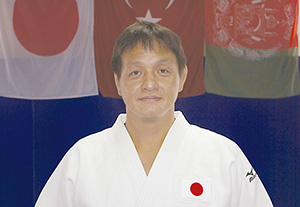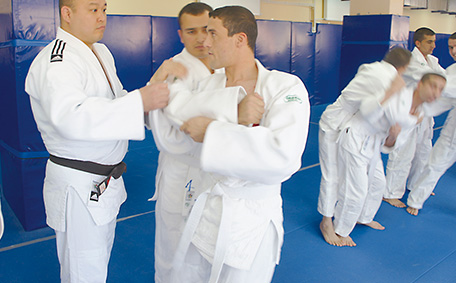Stories from the field 07
The techniques and spirit of Japanese Judo contribute to the improvement of security in Afghanistan
– Support for the training of the Afghan National Police in Turkey

Mr. Kitada at the Sivas Higher Vocational Police School in Turkey. (Photo: Takatoshi Kitada)
After over 30 years of conflict, Afghanistan continues to face many problems related to its functions as a state. The ability of police personnel to maintain public security is one of such issues. However, due to security and other concerns, it is difficult to provide police officers with sufficient training within their own country. For this reason, the Government of Afghanistan requested assistance with training from a fellow Islamic country and friend, Turkey, which in turn began a project in 2011 to train Afghan police officers in collaboration with NATO.
One of the three main pillars of Japanese support for Afghanistan, along with the assistance for the reintegration of ex-combatants into society and for the country's economic development, is the improvement of the country's capacity to maintain security including through the provision of support to the police force. Japan received a request from Turkey to cooperate in the training of Afghan police officers. In consideration of the importance of the project, the Japanese government decided to provide ODA assistance for the project conducted in Turkey, such as financial support and dispatching coaches to the project.
A distinct aspect of collaboration this time is the inclusion of Judo, a Japanese martial art widely practiced across the world, in the training. Judo experts were dispatched from Japan, and they were expected to not only train the Afghan police officers in Judo techniques in the training, but also help them learn discipline and the norms of behaviors that are indispensable for collective action. It was thought that they could contribute to improving the capacity of the Afghan police to maintain public security. So far, the Judo training has been conducted four times from 2011 to 2014, with six experts being dispatched each time to Turkey for a period of three months.
Training has taken place in the Sivas Higher Vocational Police School located in the center of Sivas in central Turkey. Every year, 500 police cadets from Afghanistan are accepted at this school, where they are trained for six months to become police officers. Judo training is one part of the curriculum. Up to this point, a total of 2,000 people have received this training. Mr. Takatoshi Kitada, who serves in Japan as an officer and a Judo coach for the Osaka Prefectural Police Department, was one of those dispatched to Turkey. He commented, “Because all of the cadets are novices, the first thing we do is to conduct an orientation where we explain what Judo is all about. We then proceed to offer a series of specific instructions on everything from Judo rules of decorum to skills such as safe falling, throws, and holds. Many believe that Judo is merely a type of fighting skill, so we repeatedly explain that Judo teaches not only techniques, but also the spirit of martial arts; that it ‘starts with a bow and ends with a bow' and that it is about discipline of one's mind and that the Judo dojo is an important place for that. In particular, we emphasize the importance of bowing when entering and leaving the dojo, when starting and ending training, and when saluting a training partner.”

Afghanistan police cadets learning judo from a Japanese instructor. (Photo: Takatoshi Kitada)
However, it has been difficult to teach the cadets even the concept of “bowing,” which is a foundational element of Judo. Afghan trainees mistook the Judo bow for a religious act, and were reluctant to perform it, having been taught that “one must only bow to the God of Islam.” Mr. Kitada explained, “We repeatedly explained to them that the Judo bow was not a religious act, but was meant to show respect to coaches and training partners. We worked hard to have them understand the meaning of the bow. In particular, zarei, the act of bowing while sitting, is quite similar to the way people pray in Islam, so at the beginning of training there was quite a lot of resistance to practicing that. As such, we initially started out by only performing bows while standing, and then from the middle of the course, once we had built a relationship of mutual trust, we instructed them in zarei.” As a result of these efforts, the cadets began to gradually understand the meaning of Judo rules of decorum and finally, there started to appear those who would take the lead in bowing at the entrance to the dojo and would stay late to train by themselves.
Additionally, it is generally said that it is also difficult to get Afghan people together into one group, as in Afghanistan many rarely have opportunities to learn how to work in a group in schools and ethnic divisiveness exists. However, as cadets would train together in the dojo, they could naturally work together as a group without discomfort. The Turkish police, who organized the training, expressed their gratitude to Japan to see this change in the cadets' attitude, saying “As they advanced in their Judo training, the Afghan cadets gradually started to form a group and acting more like police officers.” The Turkish police officers too felt the significance and impact of Judo in the way that it not only trained people to develop skills and their bodies, but also how it endowed them with mental strength and discipline in working as a group.
Looking back on his activities, Mr. Kitada commented, “I ardently hope that the cadets, who learned the spirit of Japanese martial arts, will return to their home country, exercise their abilities to improve security in their country, and make Afghanistan a peaceful and stable country.” Thus, Japanese martial arts are contributing to the promotion of peacebuilding efforts in Afghanistan.
<< Previous Page Next Page >>
Main Text | Statictics and Reference Materials | Stories from the field | Master Techniques, From Japan to the World - | ODA Topics
